Tagged: Small Business
4 Quick Tips for Managing Client Expectations
- by Alyson Shane
One of the scariest and most challenging things about going from having an office job to running your own business is that you essentially go from having one boss, to having lots of mini-bosses. This means more deadlines, more phone calls and emails, more meetings... you name it, there's more of it. This also means that instead of one boss to keep happy, you now have three, or six, or sixteen, or sixty-six bosses to manage.
I'll be honest with you: if you run a client-facing business then there is a 100% guarantee that you will eventually have to deal with a tricky client situation (if you haven't already.) I can say this confidently because people are fickle and miscommunications happen.
So how can you manage your client's expectations? I'm glad you asked:
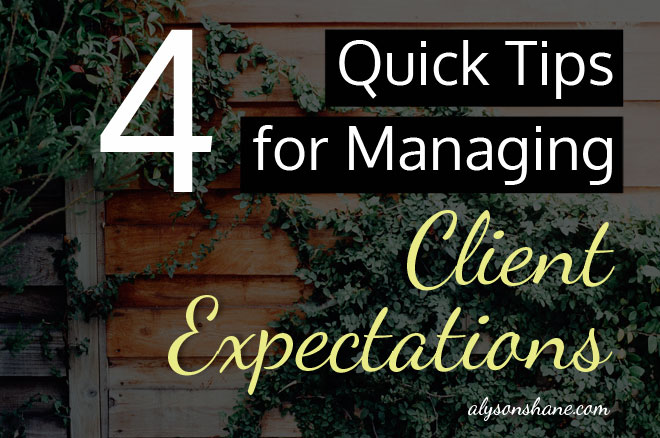
1. Keep your contracts clear
I cannot stress this enough. Don't just blindly sign, or skim over, an agreement between yourself and a new client. Contracts help keep you safe and can be instrumental to resolving disputes, clarifying issues, and other really important stuff.
In my experience I find that it's easiest to provide my clients with a contract for them to review, since I know the deliverable specifics that I need to include. It also means that I get to set the tone moving forward, and it's up to the client to make any revisions to my proposed contract, which is easier for me.
Thoroughly read through each and every client agreement and make sure that it clearly identifies the following:
- Your deliverables (monthly, per-project, or otherwise)
- Client deliverables (eg: are you waiting on information each month to create a newsletter?)
- Deliverable specifics
- Deliverable timelines, if necessary
- Payment schedules (eg: will you be paid monthly, as specific milestones are met, etc)
it's okay to go back and forth on a contract with a client. Remember: this is a negotiation, and it's better to hammer out specifics up-front so that there's no confusion about what your role is, and what you need to do for them so that you're all on the same page.
2. Under-promise and over-deliver
I'm not saying that you shouldn't go above and beyond for your clients, but giving yourself buffer room and quoting longer deadlines than you actually need can be an absolute lifesaver during busy times, or when complications arise with a project you're working on and revisions need to be done.
Not only does buffer room help you stay within a proposed timeline, but if you finish the project earlier than you quoted your clients will be over the moon for you.
3. On-board like a boss
On-boarding is critical to bringing on new clients seamlessly and make them aware of what to expect from you.
One of the things that I do to help manage client expectations is to provide a document that outlines my on-boarding process from start to finish. This document outlines the following:
- What they can expect to discuss at our each meeting/phone call
- What I need from them (eg: fill out the Brand Audit Worksheet)
- What I'll do post-meeting (eg: prepare a quote, send a contract, etc)
- Tasks, broken down by:
- Daily tasks
- Weekly tasks
- Monthly tasks
This is an approximation, as each client I work with is slightly different, but it's general enough that they know what to expect from me.
4. Set boundaries and keep them
Even if you work for yourself, keeping regular office hours is an easy way to manage client expectations. Let them know that you're at your desk from 8am - 4pm Monday - Friday (or whatever works for you) so they don't get upset that you didn't reply at 11pm on a Sunday.
I can't stress this enough: if you don't set boundaries your clients will dictate your life. Having regular office hours works for me, and I've been working towards only checking my email twice a day (it's harder than it sounds!) so that I can focus on doing work for my clients instead of spending all day replying to emails.
If you have a client that loves to get in touch after-hours (and some do) then let them know that you'll do your best to address their concern the next chance you have. This obviously doesn't apply to emergency situations, but day-to-day your clients should understand that you have a life outside of your work and should be understanding if you aren't available right that second.
---
Taking the time to set up a system that your clients can understand, and managing their expectations from the start is the easiest and best way to take care them and ensure that you have a positive, productive professional relationship for years to come.
Do you have any systems in place to keep your clients happy? Tell me in the comments!
Reflections on 365+ Days of Business Ownership
- by Alyson Shane
A few weeks ago I passed a significant personal and professional milestone:
June 30th, 2016 was my one-year anniversary as a full-time business owner.
The past 365+ days have been an incredible journey; I've learned a lot, made mistakes, discovered a lot about myself and my life has changed in so many ways that it felt appropriate to share some of the things I've learned this past year with all of you:
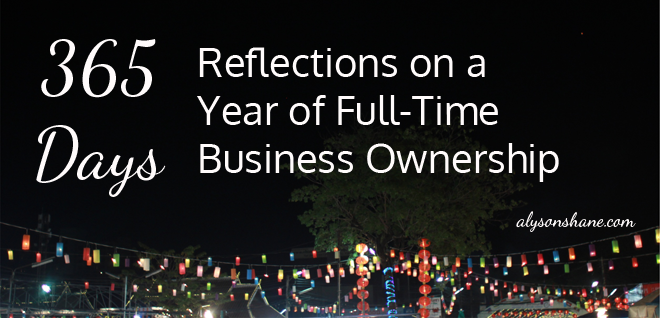
It's okay to not be a "good employee"
I'll be honest with you: I used to get depressed when I thought about my career. Even after going to university and working roles that were actually in my field (instead of being an accountant, oh my god) I'd still hadn't found a job that did it for me. I'd think of all those years ahead of me, likely spent in dull offices, trying to find a position or organization that hopefully wouldn't bore me to tears after six months and it was so depressing.
I also had a lot of anxiety around being a "good employee." I didn't like sitting at a desk for a pre-determined amount of hours, asking for permission to take an extended lunch or book an appointment, taking a vacation, or playing office politics (ugh). I'm also not afraid to stand up for myself and point out when I think something unfair or just plain wrong, which doesn't bode well in the world of 9-5's.
So what feels different? The biggest thing is that while I'm beholden to my clients, and I technically have more "bosses" now than I did before, we have a mutually respectful relationship which can be hard to find in the office world.
I'm honest with my clients, and they rely on me to create the right content and steer them in the right direction, which results in a level of respect and collaboration that I was never able to enjoy when I worked for someone else.
Your value isn't just tied up in your qualifications
Before I went to university the advice everyone gave me was "you have to go to university! You'll never be able to get a decent job if you don't go to university!" So that's what I did. I spent three years at the University of Winnipeg earning my Bachelor of Arts, and you know what? Not one of my clients has ever asked me about my formal education.
To be clear: I am in no way saying that getting an education isn't worth it. University was an amazing experience, and I learned a lot, but when it comes to running a service-based business my experience has been that it's more important to be able to demonstrate your value and your skills than it is to have a piece of paper that declares it for you.
Instead, people look at my website, blog, social feeds, and where I've been published or asked to speak to see examples of my knowledge.
You can say no to things that you don't want
One of the most empowering things that I've learned in this past year is to say "no" when something doesn't make me feel good. I don't take on projects that I don't want, and I don't work with clients that I don't like.
This is incredibly hard to do; we're conditioned to believe that every opportunity that comes our way may be the last, and especially when you're new to being a solo business owner it's hard not to think "if I don't take this, will I regret it? Why am I turning down money? Who in their right mind turns down money?!"
Except money isn't the key to happiness. Instead of chasing money, I chase value. I've turned down opportunities that could have resulted in a nice boost to my bank account, but which would have made me miserable, and I don't regret them at all. Instead, I focus my energy on finding opportunities and work that are more suited to my tastes and personality, and it feels amazing.
Irregular income takes some getting used to
Before I started working for myself I would say things like "I could never go from biweekly payments, it's so scary!" and you know what? It is, and it takes some getting used to.
Being paid on a monthly or irregular basis means that I have to pay more attention to my bank balance than I did before, but since I was planning to leave my 9-5 I spent a few months building up a nest egg which rolls over from month to month. That way I know that I have enough to cover my living expenses for a few months if a bunch of work dried up at once.
However, I think that this is worth mentioning: even though I get paid irregularly, diversifying my income feels more secure than a single job ever did. When I worked for someone else if I lost my job 100% of my income was gone, but now if I lose a client I just hustle a bit harder and find another one to replace that dip in my income.
Also, as I said above since all of my earning potential is wrapped up in how hard I work it often means that I make double or triple one month what I made the previous one.
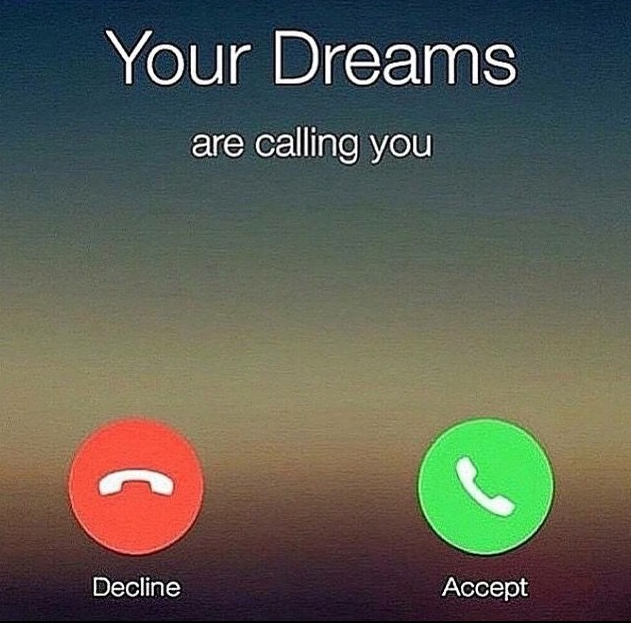
The freedom of managing your life is the most worthwhile thing
This is the single biggest takeaway that I can share with you.
I grew up believing that my work was just a means to an end; that I shouldn't expect to like my job or my work and that sitting at a desk doing uninspiring things for 40 hours a week was all I could ever hope for out of my life. This is such utter bullshit, you guys.
I've enjoyed a year of having the freedom to choose the work I want; to take an afternoon off to go shopping with a friend; to work on a Sunday or during the evening; to take a 3-week vacation to Central America and to work on the road.
I do what I want and am building my ideal life on my terms, and I get to grow something amazing and completely my own all from scratch. The work I do is fun and rewarding, and most importantly it makes my clients feel good, too.
Personal takeaways from 365+ days
I used to feel trapped by my life.
I didn't know what I wanted to do, where I wanted to go professionally, and I felt shackled to a corporate work and life that I resented and which, frankly, wasn't a good fit for me. It wasn't until I started building my client list and hanging out with other creatives and entrepreneurs that I realized that doing the thing that you love for a living is the key to being truly happy all the time.
The past 365+ days have been an exercise in un-learning a lot of things that I thought I knew about my value as a person and a creative professional. I've also learned so much about myself and have developed such a deep appreciation for my life that I can barely put it into words. It's been an exciting, challenging, and rewarding experience that I wouldn't trade for anything.
Thank you to my fantastic partner John, my incredible and supportive friends, and to my clients who do me the honour of working with me.
Alyson
6 Ways Your Small Business Can Save Money
- by Alyson Shane
Recently I received a phone call from my alma mater asking for donations to their Faculty of Arts, where I studied when I received my BA. She asked me for $5 a month, or "the cost of a single Starbucks coffee" (well played, University of Winnipeg, well played).
I'll be honest with you: I declined to give back to the university for the time being. My business is still in it's infancy, and saving money is pretty important to me right now. However, this conversation got me thinking about the ways I work to keep costs low for myself during this stage (even if that means saving that $5 a month), and I thought I'd share some of the things I've learned:

One of the most interesting assumptions that people have started to make about me since I began running my business is that this is the lifestyle I lead:

This is, much to my chagrin, not how I live my life. In fact, it's a little more like this:

Don't get me wrong, I'm doing just fine financially, but I'm not baller status quite yet. As a result, here are some of the areas where I cut costs or try not to indulge in order to keep my business expenses low:
Buying or renting space you don't need yet
One of the easiest ways to save a few hundred dollars a month (minimum!) is to avoid buying a brick-and-mortar store or renting office space for as long as you can. This, in my opinion, is the single biggest benefit to working from home.
Sure, there are benefits to an office or renting a desk in a co-working space, such as access to a board room, printing area, etc, but unless your business has grown to the point where you need those things on a consistent basis, having client meetings in coffee shops should be fine for now.
Spending on expedited shipping
Unless it's a business emergency (ie: your business will shut down without this parcel/package) you can wait the extra day or two.
Additionally, if the shipping charges for a particular item are outrageous, ask yourself: do you really need that beautiful embossed day planner that badly? Odds are, you probably don't.
Custom website design
I get it: you want to build a website that stands out from your competitor's. You want something that is completely yours, and is an accurate online representation of your business and your values.
However, what's more important is simply having a website, rather than worrying about whether or not it's built custom from scratch. Many people choose to work with existing Wordpress or Squarespace templates, which are easy to alter and personalize without the investment in a custom designed site.
Unnecessary advertising
I'm a firm believer that the best thing a person or business can do for themselves is to start to build a positive reputation for themselves online. What's great about this is that social networks like Facebook, Twitter, LinkedIn and Pinterest (the biggest and most popular ones for businesses) are all free to join.
This means that if you do hustle a little bit (or hire someone like me #ShamelessPlug) you can start to build a name for yourself and your services without having to invest in paid advertising just yet.
Not only does putting off doing paid advertising beneficial because it keeps costs low, but people will appreciate that you're connecting with them on a real, human level, and not just sending a barrage of ads their way.
Office supplies you don't need
Confession: I LOVE going to stationery stores. Every time I step into Tiny Feast here in Winnipeg my heart starts going pitter-pat and I start imagining how charming my desk would be with all those fountain pens, notebooks, staplers... you get the drift.
As much as I would love to take everything from Tiny Feast home with me, I have to ask myself: how often do I use a stapler (never), how often do I use paperclips (also never), do I really need a handmade mug to store my pens (not at all)... you get my drift.
As tempting as it may seem to try and pimp out your desk with heaps of Pinterest-worthy goodies, resist the temptation for now. You can always indulge in that gorgeous cork-top desk in the future.
Subscriptions for software you don't need
This one always gets me. I pay for a few subscriptions to various content scheduling and monitoring services (HootSuite, Buffer, etc) and it sucks to pay the monthly fees... but without them I would go absolutely bonkers and not be able to manage my shit. So, for me they are a necessary evil.
However, unless you're in the digital marketing business odds are you can avoid a lot of these monthly expenses by using free software to do what you need. Some great options are:
- Insightly (CRM system)
- Freshbooks (accounting)
- HootSuite or Buffer (free versions - social media management)
- Toggl (time management - I'd be lost without this tool)
- Trello (project management)
- Dropbox (file sharing)
It may seem tempting to invest in expensive software, or to buy a bunch pf products up-front "just in case" but if you aren't using the tool on a daily basis, and if it isn't something that your business can live without (eg: I would be utterly lost without Buffer, for example) then consider sticking with the free version, or finding a free alternative until the time comes when you either a) need the service enough that you should pay for it or b) you can afford to invest in it.
Do you have any money-saving tips for small businesses? Is there something that you wish you had learned when you were starting out? Tweet at me or tell me in the comments!
How to Create Buyer Personas That Work for Your Business
- by Alyson Shane
Let me tell you a dirty secret: I hated building buyer personas when I was taking my business courses in university. I thought they were useless, frivolous, and something that marketing agencies could charge exorbitant fees to their customers to develop.
Then, as it so often happens in the world of Being an Adult, I started running my own business and learned that I was totally wrong.
In fact, understanding and developing buyer personas was, in fact an integral part of understanding a businesses' target audience, and how best to communicate with them.
As I so often say when it comes to advice I dole out on this blog: do as I say, not as I've done. Learn from my mistakes; understand what a buyer persona is and how it benefits your business, and use it to the best of your abilities.
Not sure what a buyer persona is, or how it can help your business? No worries, I've got you covered:

What are buyer personas & what do they do?
At it's core, a buyer persona is essentially a portrait of your ideal customer.
In terms of content marketing strategy, having a comprehensive buyer persona helps businesses (or people like me!) deliver content which is timely, informative, and that your audience actually want to see and consume.
Different people respond differently to various kinda of images, messaging, and communication, and it's important to take these perspectives into consideration while figuring out how to best serve your customers.
For example, a 20-year-old Snapchat user who is starting university and has very little disposable income will have respond to different messages, and will have different motivations, goals, and purchasing power than a 45-year-old father of two who is a CEO at his company and has lots of disposable income. Now, your business may not be trying to appeal to both of these extremes, but what this is meant to illustrate is that you need to know who your ideal buyers are, why they should care about your business, and (more importantly) how your product or service can appeal to them or make their lives easier.
How can you build buyer personas that really work?
The key to building effective buyer personas is that you have to make a bunch of them. This may feel like tedious work (my university-era self would agree) but creating a few personas can help you develop well-rounded ideas about the kinds of people you want to communicate with, and who you think are the ones who would be interested in buying what you have to offer.
You don't have to get super specific, but identifying the following areas are generally pretty useful:
Basic info
- Name. This isn't technically necessary, but I like naming my buyer personas. I find it helps with keeping track of who they are, and makes them feel a bit more "real".
- Job title. Are they CEOs? Mid-level management? Students working at Starbucks? Like I said earlier, where they are in their professional life will influence their purchasing power.
- Details about their job title or role. These flesh out their day-to-day motivations at work and help inform what they may be looking for professionally.
General demographics
- Age. Different generations and age brackets have different motivations and priorities, and it's important to identify what they are in order to figure out what they want.
- Gender. Are you marketing your products to men, women, both, or otherwise?
- Location. Where your ideal customers are can make a huge difference on how you craft your message to them.
- Salary. Lots of people are afraid to talk about money and finances, but let's be honest: how much your buyers have to spend influences whether or not they have monty to buy your products or services.
- Education. People's level of education shapes a variety of areas such as their level of employment, salary, interests, and much more.
- Family. Are they single? Married? Do they have 2.5 kids? Are they close with their extended family? Their ties to their families and those obligations will influence their purchasing power.
Values & objections
- Values. What are the things that your buyers believe to be important or valuable? Eg: buying local; investing in secondhand or slow fashion; or driving an expensive BMW.
- Objections. What are some objections that could come up during the sales process? Eg: your product is too expensive; too niche; too complicated for a layman to see any value, etc.
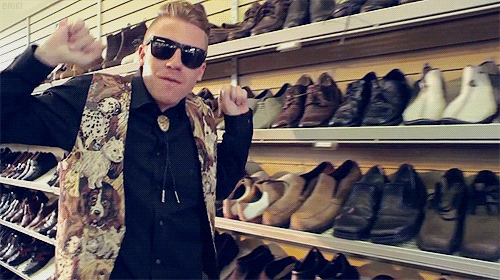
(do your buyers shop like Kanye or like Macklemore?)
Extras
This area can change a bit depending on what your business sells, but generally some other areas which can help build an accurate buyer profile are:
- Computer literacy. Do your buyers go mining for Bitcoins, or do they struggle to find the Any Key?
- News sources. Your customers' values will likely be different depending on whether they get their news from Fox News or Al-Jazeera.
- Hobbies. How your customers spend their free time can help you understand more about their motivations and values.
- Interviews and real-life examples. If you already have an existing customer base, take a look at your reviews and customer service experiences. How do people talk to your team, or speak about your business?
Sussing this information out
Figuring out all this information by yourself may seem like an impossible task, but it isn't! There are actually a variety of ways that you can find the information you need to build a series of effective buyer personas, which are:
- Asking your team and colleagues. As I said earlier, if your business is already customer-facing you can speak to team members who interact with your customers to build complete profiles.
- Check your website stats. This should be obvious, but if not some things to look for are: keywords people used to find your website, where your visitors came from, and the actions they took while they were on your page. If your website doesn't have Google Analytics installed, back the hell up and install it before coming back to this article. Your analytics tool is one of the best tools at your disposal for understanding customer behaviour.
- Use social media. Look for services or products similar to your own and spend some time analyzing the discussions happening on Facebook, Twitter, LinkedIn, and on blogs. People are more likely to share negative experiences than positive ones online, which can provide you with important insight into the areas where your buyers feel your industry could be doing better.
Why does this process matter?
This may seem like a lot of work (and trust me, it is!) but taking the time to investigate and research your potential customers and to create well-rounded buyer personas can go a long way towards helping you understand your businesses' strengths and weaknesses. Spending time on this process helps your business provide a better experience for your customers.
Still want a little more help creating an effective buyer persona? Check out these free buyer persona templates from HubSpot. They're what I use day-to-day, and I'm sure you'll find them to be invaluable, as well!
How do you create buyer personas for your business? Do you have anything to add to what I've outlined in this post? Tweet at me or tell me in the comments!
A Guide to Working Your Side Hustle While Keeping Your Day Job
- by Alyson Shane
Let's face it: there's nothing worse than feeling like you're stuck in your job.
I'll be honest with you: I was pretty unhappy at my old office job, and the biggest thing that kept me going there day after day was knowing that I could go home and work on my business.
Knowing that I could go home and pour my energy into something personal that mattered to me kept me going on a lot of days when I wanted to throw in the towel.
However, whether you're building your biz on the side, hustling your freelance gig, or working on other creative projects, it can still be tough to be able to put the effort in when you spend the bulk of your peak productivity hours at the office.
If you're serious about accomplishing your goals outside of your 9-5 then it's time to start planning, getting organized, and taking steps to make the most of your out of office hours.
Luckily, I just went through this experience, which is why I'm here to help:
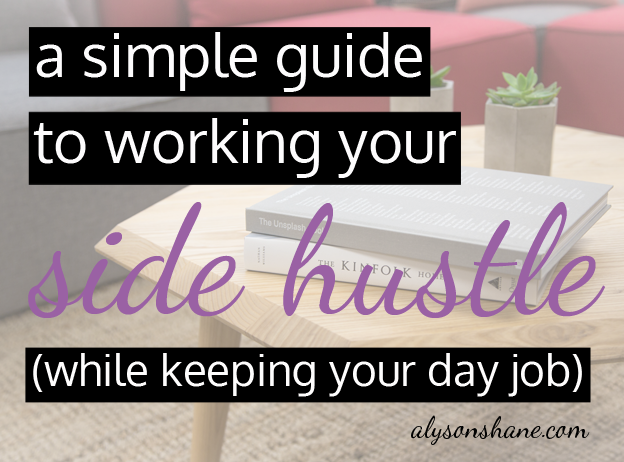
Figure out how much time you have (and be honest!)
So we already know that you have -40 hours a week to work on your side project, but it's also important to factor in other important areas of your life that can't be avoided and take up your time. Some of these can include:
- Commuting to and from work
- Going to the gym/general fitness
- Preparing and eating meals
- Socializing
- Sleep
The easiest way to figure out how much time you really have is to map it out so you can get an accurate look at how much time you really have, and how much time you can realistically spend each week.
I know that a few hours here or there may not look like a lot, but don't get discouraged! Make every hour count.
Plan, plan, plan!
Your time is limited, and if you're working on a particularly large goal, or something with lots of steps to complete it can feel like an impossible task to fit it all into your after-work hours. Don't sweat it, baby, it can be done! It just takes a little planning and preparedness.
The first thing you need to do is figure out what your goals are. They can be as vague or as specific as you'd like, but the most specific you can be, the better.
Some examples are:
- Write and publish an ebook
- Redesign and launch your website
- Put together an e-course or workshop
- Hustle your side business and grow your client base
These are all top-level goals: they're the end result, but to get there will take lots of smaller, much more manageable steps. What I used to do was sit down on a weekly or bi-weekly basis and figure out what I wanted to work on that week, and focused my attention on competing those tasks.
Prioritize and re-assess often
Once your top-level goals are in place and you've mapped out how and when you'll be taking steps to get there, it's time to prioritize your time. When you're doing lots of stuff and living a busy life it can feel hard to know what to start with (believe me!) so I find it's helpful to determine what "priority" tasks are. This is what mine look like:
- Client work and tasks that generate income
- Time-sensitive tasks, or tasks on a schedule (my newsletter, for example)
- Work that needs to be sent to someone else so they can move forward on their end
- To-dos on my business development goal list
It's important to take this seriously! It's way too easy to get wrapped up in small details, or to waste your time on something that doesn't really matter. Remember: your after-hours time is at a premium, so treat it that way.
Schedule similar tasks together
After a long day at the office it may feel like it makes more sense to say, write a blog post one night and draft your newsletter the next, but practicing "batch scheduling" can help you optimize your time and get more done.
"Batch scheduling" is exactly what it sounds like: grouping similar tasks together to optimize your time. This is especially important when doing tasks which require you to get into a "flow" such as writing or other creative pursuits. It takes time to get in and out of flow, so it makes more sense to group similar tasks together so you can stay in that mindset as you move from one task to the next.
It's also important to try and schedule your after-work work on nights when you aren't feeling mentally worn-down. You probably won't feel like sitting down and working on your financials after a busy day of meetings at the office, for example, so try to schedule mentally taxing tasks on days when your 9-5 is more low-key, and vice-versa.
Take time off

When you're hustling on the side of your 9-5 it's really easy to fall into the habit of working 24-7 (trust me on this one, I know it all too well) but if you don't schedule in time to rest and recharge your batteries you will burn out. Not only will your side projects begin to see the strain, but your productivity at your 9-5 will begin to slip as well, and that's not good!
With this in mind, schedule time to catch up on the latest Game of Thrones, go for a hike with your friends, or basically do something that isn't working on your side project when you're not at work.
Taking the time to look after yourself ensures that you'll have the steam to keep firing on all cylinders, both at your 9-5 and at your side gig, for a long time.
Do you have any tips for working on your side hustle while keeping a day job? I'd love to hear them!
Being a Small Business Owner: 5 Things You Need to Know
- by Alyson Shane
Today I did a "big kid" business owner task and complied all of my information to send to my accountant for tax time. It was stressful, a little bit chaotic, but ultimately felt good to be done and over with.
The reason it took me so long (and caused me more than a little anxiety) is because when I started my business a year and a half ago I didn't expect it to scale so quickly, and as a result I kind of floundered through the first few months of it without real systems in place to help me stay organized.
Now, boy do I know better.
Largely what I know has come through trial and error, but I've also had some great discussions with friends, colleagues, and mentors who have helped me figure this stuff out and get on the right track. And, since sharing is caring, I figured I'd share a list of 5 of the most important thins I've learned with you:
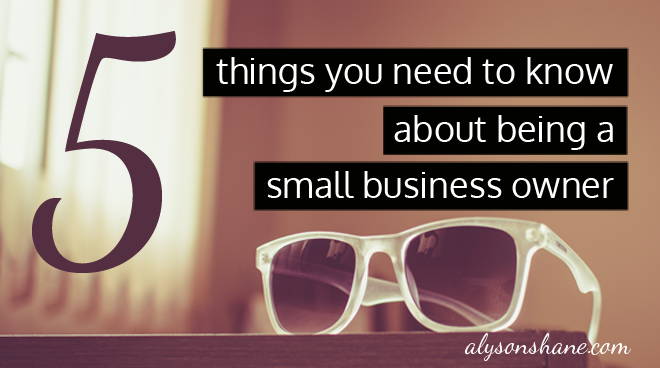
1. Every day is unpredictable
This is probably the biggest understatement of the century! I do my best to be as organized as possible and use checklists and planners, but sometimes a client throws a curveball my way which eats up my entire day.
As a result, I've had to learn to be a lot more flexible. Not just with my time, but with my expectations of what I planned to accomplish during that time. Clients will often send pressing need-to-handle emails moments before they actually need something, or someone will call me while I'm in the middle of writing an in-depth piece, or any variety of things. Whatever the case, be prepared for the unexpected.
2. Developing your systems early on is a lifesaver
Believe me, you'll thank yourself later. Like I mentioned at the top of this post, when I first started freelancing I didn't give much thought to how my folders were organized, where my invoices went, how I tracked my time... you get the drift.
Do as I say, not as I do. Here are some tips to develop strong systems:
- Pick a file structure and stick to it. Be consistent in your folders and sub-folders!
- Use invoice numbers to keep track of your invoices, and use a spreadsheet to track what's outstanding and what has been paid (I recently started doing this thanks to a conversation with my friend Elise and it's a lifesaver)
- Track your time. I use Toggl to keep track of everything I'm doing, and review my logs often to figure out what I'm spending the most amount of time on.
- Use the heck out of your calendar.
3. You'll think about work constantly
When you own something and you're trying to build it, it's almost always on your mind, and that's totally okay!
In fact, it's probably the thing that is going to make you successful and keep your business from going under, because if you're always thinking about it, then you're more likely to come up with new ideas, systems to streamline your processes, and ways to hustle your product or services.
I'll be honest: if you're the kind of person who wants punch the clock and then forget about everything you did Monday to Friday, then this isn't the lifestyle for you.
4. You'll always have stuff to do
This can actually feel overwhelming from time to time, because even when I've checked off all of my client "to dos" there's still a long (looooong) laundry list of things that I need to take care of to make sure my business is running smoothly. This could be anything from developing new products, to researching a new social trend, to filling up my content calendar... there's never a dull moment.
There are definitely times when this can feel overwhelming, but that's totally normal! Just take a deep breath, grab a glass of wine (or whiskey), pump some music and push though the first few items on your to-do list. Trust me, once you've checked a few off you will feel a million timed better.
5. You'll feel guilty when you "switch off"
(but do it anyway)

It's important to have rest days and days where your eyes aren't glued to your computer screen, or you don't set foot in your store (if you have a brick-and-mortar business) because - trust me on this - you will burn out, honey. Even if you can't entirely unplug, set aside a few hours of "me time" and take a bath, hit the gym, grab a greasy burger with your besties... whatever you need to do to unwind and recharge your batteries.
When I was on vacation in Central America for three weeks I definitely had bouts of "oh my god, will my business be there when I get back?!" but you know what? Being away from the day-to-day tasks helped me come up with some really terrific ideas, and when I came back I felt 100% refreshed and ready to dive headlong into things. I highly recommend vacations, even short ones, specifically for this purpose.
The truth of the matter is that there are a million other things you "need to know" about running a small business (which I'm sure I'll get around to blogging about at some point!) but what it really boils down to is that it's a crazy, intense, rollercoaster of fun, stress, and good vibes.
All my luck to you in your small biz adventure!
Want more posts like this? Tell me what you'd like me to blog about next on Twitter, via email, or in the comments!
How to Take a Real Vacation While Running Your Own Business
- by Alyson Shane
With my Central American vacation extravaganza coming up tomorrow (gulp!) , I've been experiencing a higher than usual degree of anxiety around my business. This will be the first time that I'll really be "away" from my work in any real capacity, and I'm starting to realize why only 9% of the 200 business owners interviewed in a survey by OnDeck allowed themselves to take a full two-week vacatio.
This is really distressing news! Relaxing and taking a break is crucial to being productive and happy, and it provides much-needed downtime away from all the screens and stresses of everyday life. Even better, with recent advances in technology business owners can work from virtually anywhere, meaning that they can check in and give themselves peace of mind that their hard work isn't crumbling to pieces while they're on the beach.
However, in order to go away on a vacation and not lose your mind, there are a few steps that you can take to help alleviate anxiety and keep things running properly while you're away. Here are some which have helped me:
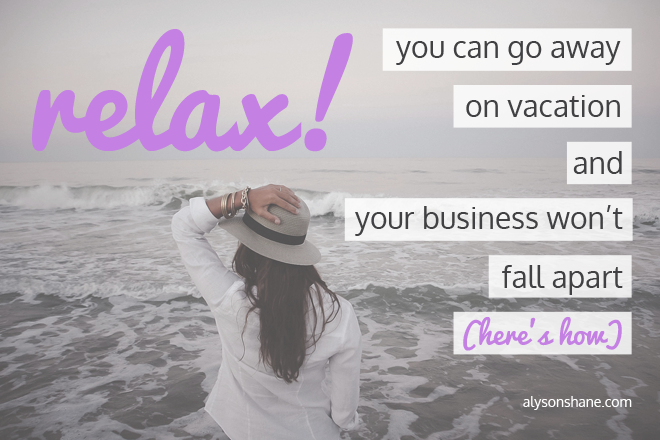
1. Have someone you trust step in for you
If you manage a business with a few employees, then speak to one of them about handling some of your more pressing duties. Having someone that you trust, whom you know can handle themselves in a crisis and won't burn your business to the (figurative) ground will go a long way towards making sure you aren't stressing out the entire time you're gone.
In my case, I'm getting someone I trust to handle my client's accounts while I'm away. I've planned out as much content in advance as I can, and made my clients aware of a very strict cutoff date for info pertaining to pressing ads and marketing campaigns, so that way all that person has to do is a bit of community management (ie: replying to Tweets and comments as needed).
2. Communicate your expectations
If you run a service-based business like I do, communication is key. This is great day-to-day advice, but is especially applicable when you're about to go away on vacation. Keeping your clients or customers in the loop goes a long way towards building trusting relationships, and helps set their expectations as to what you can reasonably do while you're away.
To illustrate: last week after the holidays ended I sent all of my clients an email with a friendly post-holiday message, and a reminder that I'm going out of town. Now they know the exact dates I'm leaving and returning, as well as the final submission date for any content they need created or scheduled. I also asked them to think of any upcoming events or promotional opportunities, and to let me know ASAP so I that I can plan ahead to make sure nothing gets missed.
I also let them know that, while I will be checking my email from time to time, I'll be in the jungles (or beaches!) of Central America and have no idea what the wifi will be like, so it may take me a few days to respond. By communicating expectations in advance, both parties know what to expect.
If you have employees, make them aware of what you expect them to do while you're away. Having a checklist or defined list of tasks and goals can go a long way towards helping them stay motivated in your absence, and defines clear expectations so there's no confusion.
3. Set boundaries
The point of a vacation is to peel yourself away from your screen.
As someone who literally makes their living online, I know that I'm going to struggle to not keep my face buried in my iPhone screen the entire time, and honestly this is giving me some anxiety.
I'm lucky that a lot of the places we're going will probably have pretty slow, spotty wifi, which will help force me off my phone, but if you're going somewhere with a strong connection, like a resort or somewhere that isn't in the middle of the Guatemalan jungle, then setting rules like "I only check my email in the morning over coffee" can go a long way to keeping you sane.
Not just that, but having a rule for when you "check in" can also help your clients and employees (if you have them) know when to expect to hear from you, and when the best time to get in touch with you will be.
4. Use collaboration tools & group chats
There are a variety of collaboration tools online such as Slack, Asana, Evernote, BaseCamp, and Trello (my personal fave) which you can use to stay in the loop about various projects and opportunities. By making the most of these tools you can communicate and catch up with your team or clients quickly and effectively, leaving more time to hang out and relax.
In the event of a crisis, tools like Google Hangouts and Skype are great for having a quick chat to solve the problem. This can work great for employees who are stressed out during a crisis, or a client who is having a meltdown while you're on another continent.
How do you keep from going crazy when you go away on vacation? Tell me in the comments!
